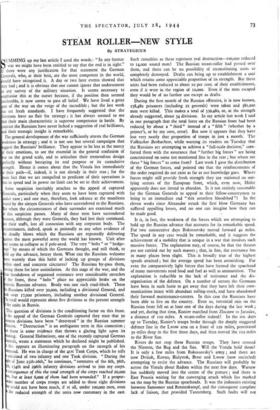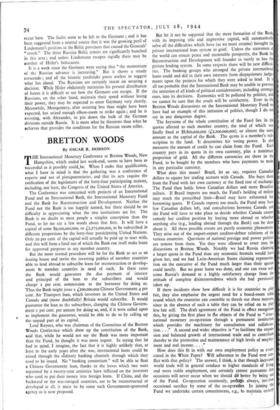STEAM ROLLER NEW STYLE
By STRATEGICUS
UMMING up my last article I used the words: " In any former
war we might have been entitled to say that the end is in sight." there were any justification for that statement the German enerals, who, at their best, are the most competent in the world, hould have' recognised it. A day or two later events showed that hey had ; and it is obvious that one cannot ignore that endorsement n any survey of the military situation. It seems necessary to mphasise this at the outset because, if the position then seemed ntolerable, it now seems to pass all belief. We have lived a great art of the war on the verge of the incredible ; but the last week as set fresh standards. I have frequently suggested that the ermans have no flair for strategy ; it has always seemed to me hat their main characteristic is supreme competence in battle. By ontrast the Russians have never lacked a suggestion of real brilliance, nd their strategic insight is remarkable.
The general development of the war sufficiently attests the German Takness in strategy ; and it is not one but several campaigns that uggest the Russians' brilliance. They appear to be less at the mercy f their emotions, to see the essential in the general confusion of ar on the grand scale, and to articulate their tremendous design -rfectly without betraying its real purpose or its cumulative trength. Hence it comes about that the Vistula lies immediately n their path—if, indeed, it is not already in their rear.; for the ain fact that we are compelled to predicate of their operations is at in speed and in power no limit can be set to their achievement.
Some suspicion inevitably attaches to the appeal of captured enerals, particularly when they seem to have been captured with ndue ease ; and one may, therefore, look askance at the manifesto ssucd by the sixteen Generals who have surrendered to the Russians. tut when the circumstances of their surrender are examined much if this suspicion passes. Many of these men have surrendered ecause, although they were Generals, they had lost their command, st their staffs, lost all connexion with any corporate body. The ucumstances, indeed, speak as pointedly as any other evidence of he deadly blows which the Russians are repeatedly delivering gainst the most powerful army the world has known. Unit after nit seems to collapse as if pole-axed. The very " bolts " or " hedge- ogs " by means of which the Germans thought, and still think, to old up the advance, betray them. What can the Russians welcome are warmly than this habit of locking up groups of divisions ithin steel and concrete cinctures? The Russians by-pass them, aving them for later assimilation. At this stage of the war, and the Lear breakdown of organised resistance over considerable stretches f the front, these " bolts " place no appreciable brake on the aiestic Russian advance. Brody was one such road-block. There e Russians killed over 30,000, including a divisional General, and k over 17,000 prisoners, including another divisional General. e total would represent about five divisions at the present strength f the units in Russia.
This question of divisions is the conditioning factor on this front. the appeal of the German Generals captured they state that 3o erman divisions have been "destroyed " in the Russian summer ensive. " Destruction" is an ambiguous term in this connexion ; t there is some evidence that throws a glaring light upon its ning. General Hofmeister, one of the recently captured German nerals, wrote a statement which he declared might be published. this appears an illuminating paragraph on the strength of his and. He was in charge of the 41st Tank Corps, which he tells Consisted of two infantry and one Tank division. " During the t of June 25th-26th," he continues, "remnants of the 6th, 36th, Lk 134th and 296th infantry divisions arrived to join my corps. consequence of this the total strength of the corps reached 20,00o , but at least 6,000 of them had been wounded." If a propor- te number of corps troops are added to these eight divisions could not have been much, if at all, under too,000 men, even the reduced strength of the units now customary in the east.
to
Such casualties as these represent real destruction-1 oo,000 reduced to 14,000 sound men! The Russian steam-roller had passed over them, and there can be no possibility of reconstituting units so completely destroyed. Drafts can bring up to establishment a unit which retains some appreciable proportion of its strength. But these units had been reduced to about to per cent. of their establishment, even if it were in the region of wpm Even if the men escaped they would be of no further use except as drafts.
During the first month of the Russian offensive, it is now known, 158,480 prisoners (including 22 generals) were taken and 381,000 men were killed. This makes a total of 539,480, or, at the strength already suggested, about 54 divisions. In my article last week I said in one paragraph that the total force on the Russian front had been reduced by about a " third " instead of a "fifth " (whether by a printer's, or by my own, error). But now it appears that they have lost very nearly that proportion of troops in just a month. The Volkischer Beobachter, while warning its readers on Tuesday that the Russians are attempting to achieve a " full-scale decision," com- forted them with the assurance that " further big forces " are being concentrated on some not mentioned line in the rear ; but where are these " big forces " to come from? Last week I gave the distribution of the German forces, and pointed ont that the reinforcements of the order required do not exist as far as our knowledge goes. Where forces might still provide fresh strength they are stationed on out- lying sectors of the European front, which, even now, Hitler apparently does not intend to abandon. Is it not entirely reasonable for the German Generals to appeal to their fellow-countrymen to bring to an immediate end " this senseless bloodshed "? In the eleven weeks since Alexander struck the first blow Germany has suffered appalling losses, and no one can imagine how they can be made good. • It is, in fact, the weakness of the forces which are attempting to hold up the Russian advance that accounts for its remarkable speed. For two consecutive days Rokossovsky moved forward 40 miles. The speed in any case would be remarkable, and it suggests the achievement of a mobility that is unique in a war that involves such massive forces. The explanation may, of course, be that the thrusts are not carried out by such masses ; that, in fine, the resistance has in many places been slight. This is broadly true of the highest speeds attained ; but the average speed has been astonishing. For even the comparatively light forces that have formed the spearhead of many movements need food and fuel as well as ammunition. The explanation is reducible to the lack of resistance and the dis- organisation of the defence. On a number of sectors the Germans have been in such haste to get away that they have left their com- munications intact with abundant rolling-stock, and have abandoned their forward maintenance-centres. In this case the Russians have been able to live on the country. Even so, torrential rain on the Russian front fell on at least one of the days during the last week ; and yet, during that time, Koniev marched from Zloczow to Jaroslav, a distance of 1 to miles. A steam-roller indeed! In the ten days up to Tuesday, Koniev's troops broke through the deeply staggered defence line in the Lwow area on a front of 120 miles, penetrated 3o miles deep in the first three days, and then moved the 1 to miles to the River San.
Rivers do not stop these Russian troops. They have crossed the Niemen, the Bug and the San. Will the Vistula hold them? It is only a few miles from Rokossovsky's alsny ; and there are now Dvinsk, Kovno, Bialystok, Brest and Lwow (now encircled) attempting to resist the advance. The Russians will probably be across the Vistula about Radom within the next few days. Warsaw has suddenly moved into the centre of the picture ; and there is East Prussia waiting for the converging attack which lies marked on the map by the Russian spearheads. It was the jealousies existing between Samsonov and Rennenkampf, and the consequent complete lack of liaison, that provided Tannenberg. Such faults will not occur here. The faults seem to be left to the Germans ; and it has been suggested from a neutral source that it was the growing peril of Lindemann's position in the Baltic provinces that caused the Generals' " revolt." The three Russian Baltic armies are significantly bunched in this area ; and unless Lindemann escapes rapidly there may be another of Hitler's holocausts.
It is a week since the Germans were saying that " the momentum of the Russian advance is increasing." But it shows a steady crescendo ; and all the historic yardsticks prove useless to suggest what lies ahead. The Russians are certainly intent on securing a decision. While Hitler obdurately maintains his present distribution of forces it is difficult to see how the Germans can escape. If the Russians, on the other hand, maintain 'their speed without losing their power, they may be expected to enter Germany very shortly. Meanwhile, Montgomery, after securing less than might have been expected, has seized enough elbow-room to strike again ; and he is assisting, with Alexander, to pin down the bulk of the German divisions outside Russia. It is more what he threatens than what he achieves that provides the conditions for the Russian steam roller.



























 Previous page
Previous page